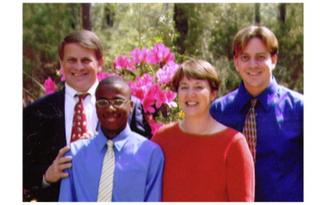
Before I move on from the post(s) of yesterday, the teacher in me wants you to notice something about those excerpts: stop and look for 1) speaker attributions and 2) adverbs. Unless I've missed one, I count only 2 speaker attributions (said, asked) and NO adverbs.
I tell my writing classes that when you see an adverb, your gut reaction should be "boo, hiss." (VBG). Yes, of course you can use one
sometime, but your writing will probably be stronger without it.
The following is from the end of the Magdalene manuscript. I started adding these after I wrote some biblical fiction and started getting reader comments about how I got this or that wrong because I hadn't done my homework. Sigh. I always do my homework, lots of it, but once the book is out, I have no way to respond. So now I take preemptive measures to head off (some) questions and comments.
An Interview with Angela Hunt
Q: Don’t you find it a little intimidating to write a novel where you’re putting words into Jesus’ mouth?
A: Absolutely! That’s why I tried to use his actual words, or slight paraphrases, whenever possible.
Q: Okay—I have to know. Mary Magdalene was a real person, and of course I recognized the names of the disciples, but what about all the other characters? Which are fictional and which are real?
A: The challenge of a historical novelist is to flesh out the story world with fictional characters and events while not contradicting the historical record. So yes, Mary Magdalene is real, as were the other women around Jesus, the disciples, the emperors, and several other names you’ll recognize from the New Testament, including Claudius Lysias. Incidentally, Peter did have a wife who traveled with him, so she must have been one of the women around Jesus. Which one? I chose Susanna, but I could be wrong.
The fictional characters? Atticus, Flavius, Quintus/Binyamin, and Hadassah.
Q: You chose not to depict Mary Magdalene as a fallen woman, but that’s how I’ve always heard her described—
A: Poor Mary! She really has been falsely accused all these years. Tradition has furnished us with much information about Mary that is almost certainly inaccurate. History does not portray her as a prostitute, an adulterous woman, or Jesus’ wife. The only thing Scripture tells us specifically about Mary from Magdala is that Jesus delivered her from seven demons.
We can assume other things about her from the biblical record: first, she was probably an older and much-respected woman because she is listed first seven of eight times when Scripture names the women present with Christ. Those who would portray Mary Magdalene as a prostitute, an adulteress, or Jesus’ wife have taken their cues from misguided sources.
Q: Didn’t the Pope say Mary was a fallen woman?
A: Many people, including Pope Gregory I, have confused Mary of Magdala with the unnamed “sinful woman” who anointed Jesus’ feet at Shimon’s house (Luke 8:36-39) and Mary of Bethany, who anointed Jesus’ feet at her house (John 12:1-7). But in 1969, the Catholic Church quietly admitted Gregory was mistaken—clearly, Luke and John were not talking about Mary Magdalene.
Others have tried to portray Mary Magdalene as the woman taken in adultery (John 8:1-11) . . . but this could hardly be Mary, as this scene happens outside Jerusalem, and Mary lived in Magdala before meeting Jesus. Furthermore, the most ancient Greek manuscripts do not include John 7:53-8:11, so the story may be apocryphal.
Q: Seems like there’s a lot of mumbo jumbo about Mary today—she’s a goddess, she’s the female apostle, she’s part of a new Age Religion—
A: And all of that ‘mumbo jumbo’ is nothing but second century man’s attempt to reduce salvation, an act of God, to an act of man. The Gnostics elevated Mary in their doctrine, particularly in apocryphal works such as the Gospel of Philip and the Gospel of Mary. (Gnosticism is the attempt to attain salvation through gnōsis, or ‘knowledge’ rather than faith. Such knowledge regularly dealt with the intimate relationship of the self to the transcendent source of all being, and this knowledge, according to Gnostics, was often conveyed by a “revealer.”
[1]) They have tried to depict Mary as a prophet in her own right, or even as an “apostle to the apostles,” but nothing in Scripture validates such a concept.
Q: But since the publication of
The DaVinci Code, everyone’s been saying that Mary Magdalene was Jesus’ wife . . . or at least his lover.
A: Was Mary Jesus’ lover? Don’t think so!
I love the way my friend Liz Curtis Higgs handles this topic in her book
Unveiling Mary Magdalene:
“Jesus loved Mary Magdalene, certainly. He knew her well. But he used the same words for all his disciples—to love, to know. Same Greek words, same emotions. In a sense he knows us all ‘very well.’ The psalmist confessed for all of us: ‘You know when I sit and when I rise; you perceive my thoughts from afar. You . . . are familiar with all my ways’ [Psalm 139:2-3].”
[2]Many contemporary feminists and goddess-worshippers have attempted to elevate Mary Magdalene by linking her sexually with Jesus . . . a contradiction in approaches if ever there was one.
Bottom line: Jesus lived a sinless life that included abstaining from fornication and distraction. He was wholly dedicated to the Father’s will and his purpose of redeeming mankind. In repeated dealings with men and with Satan, he refused to allow himself to become entangled with the affairs of this world.
Q: You’ve portrayed Mary M. as quite the businesswoman. Isn’t that a little out of keeping with the role of women in those times?
A: Not necessarily. The virtuous woman of Proverbs 31 runs a business and a home. From what Scripture tells us, I think we can assume Mary had a source of income and could have even been wealthy. Luke wrote that the women who traveled with Jesus provided financial support for his ministry (Luke 8:1-3).
From the fact that Mary had the freedom to travel and money of her own we can surmise that she might have been a widow with no surviving children—otherwise, her children would have inherited her husband’s property.
Q: You used some Hebrew names and some Greek names—why the mix?
A: I wanted to give the story an authentically Jewish flavor, but I ran into difficulty with names. First, so many of them are repeated—Miryam was an extremely common name, as were John (Yochanan) and Simon (Shimon). If I thought the Hebrew name might cause a contemporary reader to stumble, in some instances I opted for the more common name, hoping to clarify the differences between characters.
Actually, the characters themselves would have answered to several names. Galileans lived in a bilingual region that had been thoroughly infiltrated with Gentiles who spoke Greek, the lingua franca of the day. In the New Testament we find Peter’s name used in myriad ways:
Simeon, Cephas, Simon, Peter, Petros, and the Hebrew
Kefa. Take your pick.
The disciple we know as Peter was more frequently referred to as
Simon during Jesus’ ministry and
Peter in the church age, but I tried to keep things simple. The apostle Paul (Hebrew
Sha’ul), did not play a large role in this book, so I used Sha’ul whenever he appeared in the story.
Q: Was it difficult to pin down exact dates and references for the story?
A: Yes—though I studied dozens of reference books, few of the experts agree! I finally went with a consensus of opinion. Few references agree on the exact dates of Jesus’ birth, death, and years of ministry, but all of them are remarkably close. For the record, this book supposes that Jesus began his ministry in AD 30 and was crucified in AD 33.
Q: I was hoping you’d include the scene of Jesus in Gethsemane . . .
A: As much as I would have liked to include every event in Jesus’ ministry, the limited scope of a novel made that task impossible. Plus, I was working from Miryam’s and Atticus’s limited perspectives, so I could only record events they might have seen and experienced.
Q: When Jesus meets Mary outside the tomb, my Bible says that he said, “Touch me not.” But you have her clinging to his feet.
A: I read several sources and translations, and the best meaning of Jesus’ words is “Don’t cling to me.” So Miryam must have touched him, she probably wanted to cling to him, but Jesus had something important for her to do . . . just as he has an important task for each of us.
Q: As I read about Atticus and the baby, I kept wondering—what did they use for diapers in the first century?
A: You know, I wondered the same thing! Scripture talks about swaddling clothes for newborns, but there’s no way you’re going to keep a toddler swaddled.
So I did a little research and discovered a technique called—are you ready for this?—elimination timing. Apparently it’s still in use all over the world. As I read the overview, it occurred to me that it’s pretty much like training a puppy—you pay close attention to the child’s signals and, after waking or eating, you give them an opportunity to, well, eliminate. It’s helpful if the child wears a tunic and nothing underneath.
Oh, the things I learn in this job . . .
Q: So what was the most interesting thing you learned?
A: Tough question. All of it was interesting, but my eyes were opened to how radical Jesus’ preaching was and how much my faith owes to Judaism. For years I’ve read Jesus’ words in Matthew 9:16-17 and not really understood the metaphor: “And who would patch an old garment with unshrunk cloth? For the patch shrinks and pulls away from the old cloth, leaving an even bigger hole than before. And no one puts new wine into old wineskins. The old skins would burst from the pressure, spilling the wine and ruining the skins. New wine must be stored in new wineskins. That way both the wine and the wineskins are preserved.”
After researching this book, the analogy became clear. Jesus was presenting a new way to relate to God, and the Jews who followed him had to accept some radically different ideas—that God was One and also a Trinity, that the God whose name is too holy to be spoken could be addressed as “abba” or “daddy,” and that women, who were never taught the Law, could sit and learn at the Savior’s feet.
Faith in Jesus (the patch) had to be adapted to Judaism (the coat) and Judaism (the old wineskins) had to be reconditioned in order to hold the new wine (faith in Christ).
Q: Anything else you’d like to add?
A: As always, I need to thank some folks: first, a huge thanks to Terri Gillespie, director of Project Nehemiah, for making sure the manuscript had a proper Jewish flavor. Like me, Terri has a deep and abiding love for Isra’el. She works for the Messianic Jewish Alliance of America, an amazing organization which can be found at
http://www.mjaa.org/. Thanks also to Susan Richardson for proofreading an early draft, and to Randy Ingermanson, who helped me make sense of several ancient manuscripts.
[1]P.J. Achtemeier,
Harper's Bible Dictionary (San Francisco: Harper & Row, 1985).
[2] Liz Curtis Higgs,
Mad Mary (Sisters, OR: WaterBrook Press), 2001, p. 189.
 Photo: what usually sits on the top of my desk.
Photo: what usually sits on the top of my desk.


















